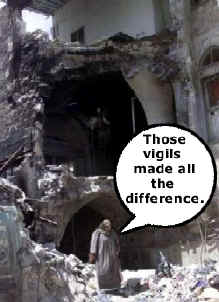Iran has nuclear ambitions. We cannot allow them to develop the world’s most destructive weapons. Where have you heard this before? It seems incredible that, with the fire we started in Iraq still burning out of control, we appear to have Iran in the crosshairs. The constant drumbeat of inflammatory rhetoric and hysterical accusations makes open conflict seem  more and more inevitable with each passing week. Some say the hostilities have already begun, and there can be little doubt that the more clandestine limbs of our $400+ billion-a-year military octopus are now coiling their way through the Persian hinterlands, just as they did for many years in Iraq prior to the U.S. invasion. You would think that someone in the administration would understand what a huge mistake such an adventure would be… but it pays to remember that these folks truly believe Operation Iraqi Freedom has been a screaming success. And if today’s Iraq is what “success” looks like, then a bloody, protracted regional war sparked by an attack on Iran will likely be viewed as a great triumph by Bush, Cheney, Rumsfeld (the never-say-die kid) and Rice. And Hannity and Limbaugh. Did I forget anyone? Good — then we just need six helmets, six rifles, and a flight to Teheran. Let’s get this party started!
more and more inevitable with each passing week. Some say the hostilities have already begun, and there can be little doubt that the more clandestine limbs of our $400+ billion-a-year military octopus are now coiling their way through the Persian hinterlands, just as they did for many years in Iraq prior to the U.S. invasion. You would think that someone in the administration would understand what a huge mistake such an adventure would be… but it pays to remember that these folks truly believe Operation Iraqi Freedom has been a screaming success. And if today’s Iraq is what “success” looks like, then a bloody, protracted regional war sparked by an attack on Iran will likely be viewed as a great triumph by Bush, Cheney, Rumsfeld (the never-say-die kid) and Rice. And Hannity and Limbaugh. Did I forget anyone? Good — then we just need six helmets, six rifles, and a flight to Teheran. Let’s get this party started!
(I’m going to miss Scotty McClellan. Sure
wish I could start missing Rumsfeld, as well.)
Seriously — is there anyone in the U.S.who’s truly convinced by this hokum about Iran? Are we cowering in the shadow ofyet another colossal threat, too enormous to be ignored? As Ross Perot used to say, this is just sad. We seem to be sleepwalking our way into yet another unnecessary war, spurred on by the same kind of transparent exaggerations that brought us to Baghdad. As I’ve mentioned in this column before, the U.S. has now established a very weak standard for invading other countries, and unless we start actively resisting on a grassroots level, this administration and its successors will just do it again and again and again. I’m personally convinced that if there were a draft, resistance to these optional wars would be overwhelming. As long as we can ignore these conflicts, we won’t feel compelled to do anything about them, aside from grumble and perhaps quietly disagree with the policymakers. Not enough to stop a juggernaut.
Back in February-March 2003 on the eve of Bush’s “shock and awe” campaign, many thousands of Americans took part in candlelight vigils and protests, with turnouts I would have thought inconceivable just a few months before (In my little town of Utica, NY, about 200 people turned out along the main street, and passersby were overwhelmingly supportive). Many thought this might be enough to change a policy long-since decided upon and set in motion. It wasn’t, and I think a lot of people fell into a kind of disillusionment with the process of non-violent resistance. This is where the Iraq war differs most dramatically from Vietnam — during the Vietnam war, most families didn’t have the luxury of simply turning away. You, your child, your sibling, your parent…. perhaps several family members were  liable to be sent over there to kill or be killed, so you would tend either to be on the “victory” bandwagon or on the barricades of the anti-war movement. It took a long time even under those circumstances for opposition to build, but eventually it reached a magnitude that deeply troubled policymakers and forced action. Today, the draft would never be tolerated. And the main engine for opposing the Iraq war is resistance by military families, who have been given the full burden to bear on their own.
liable to be sent over there to kill or be killed, so you would tend either to be on the “victory” bandwagon or on the barricades of the anti-war movement. It took a long time even under those circumstances for opposition to build, but eventually it reached a magnitude that deeply troubled policymakers and forced action. Today, the draft would never be tolerated. And the main engine for opposing the Iraq war is resistance by military families, who have been given the full burden to bear on their own.
When it comes to the actual fighting, this is their war… but when it comes to the ultimate responsibility for ending it, it’s ours.
